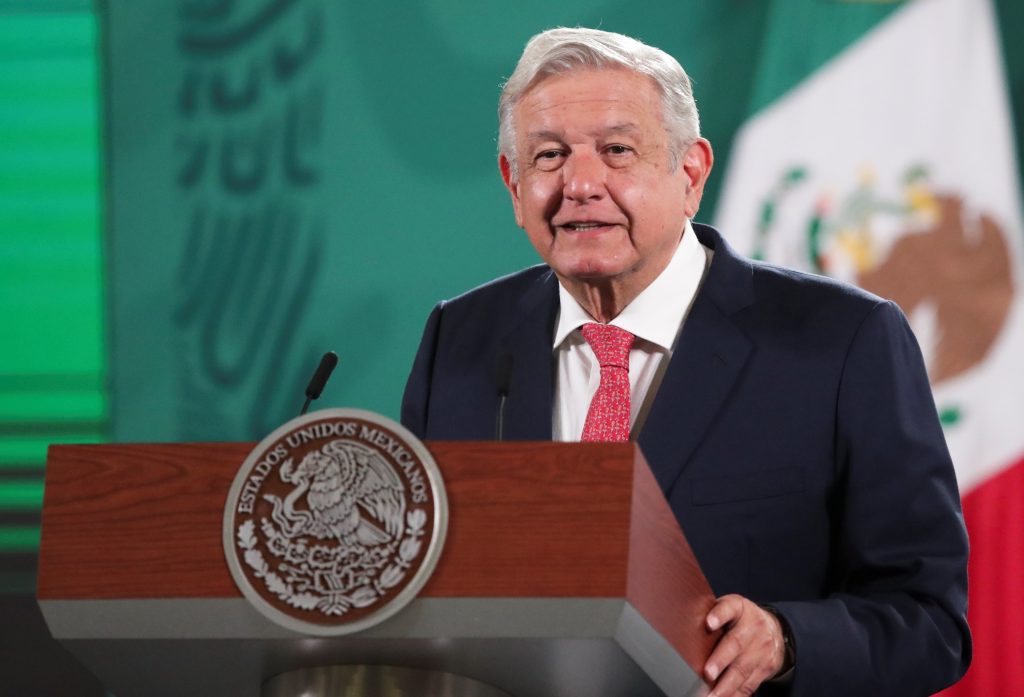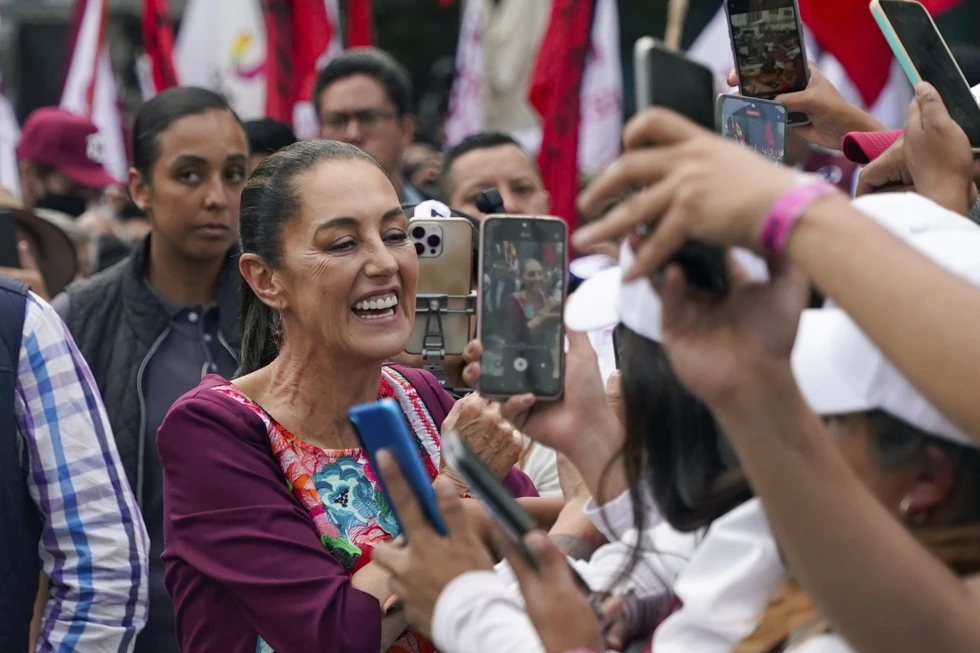The incident that took place in Tapachula, Mexico, where masked men stopped the vehicle carrying Mexico’s leading presidential candidate, Claudia Sheinbaum, is a stark reminder of the challenges and issues that the country faces.
The interaction between Sheinbaum and the masked men highlights the deep-rooted concerns regarding security and violence in the southern state of Chiapas.
Sheinbaum, who is the candidate for the governing Morena party, remained composed and listened attentively to the concerns raised by the masked men.
The fact that they felt “powerless” due to the lack of security measures taken by the government is a troubling indication of the state of affairs in the region.
The men’s plea for Sheinbaum to address the violence and insecurity in their township, Motozintla, reflects the desperation and fear that many communities in Mexico are facing.
The incident also sheds light on the broader issue of violence and insecurity that plagues many parts of Mexico. The country has been grappling with high levels of crime, drug trafficking, and violence for years, and the government’s efforts to address these issues have often fallen short.
The masked men’s call for action from Sheinbaum as a potential future president underscores the need for strong leadership and effective policies to tackle these pressing challenges.
As the June 2 election approaches, it is crucial for political candidates like Sheinbaum to listen to the voices of ordinary citizens and address their concerns.
The incident in Tapachula serves as a poignant reminder of the importance of prioritizing security and safety for all Mexican citizens.
It is imperative for the government to take concrete steps to ensure the well-being of its people and to prevent communities like Motozintla from descending into chaos and despair.
In conclusion, the incident involving Claudia Sheinbaum and the masked men in Tapachula highlights the urgent need for action to address the violence and insecurity in Chiapas and other parts of Mexico.
It is a call to arms for political leaders to prioritize the safety and well-being of their citizens and to work towards creating a more secure and stable environment for all.
Only through strong leadership, effective policies, and genuine commitment to the welfare of the people can Mexico overcome the challenges it faces and build a brighter future for all.
During her recent campaign swing through Chiapas, Claudia Sheinbaum, the current frontrunner in the Mexican presidential race, found herself in a precarious situation.
She was escorted by the army and national guard due to the escalating violence in the region, where rival cartels are vying for control of lucrative smuggling routes and forcibly recruiting locals.
The border area of Chiapas has long been a hotspot for cartel activity, with the Sinaloa and Jalisco New Generation cartels engaged in a bloody turf war. As a result, thousands of people have been displaced, and the region has become a dangerous and volatile place.
Despite the risks, Sheinbaum continued her campaign tour, only to encounter masked men believed to be affiliated with one of the warring cartels.
The incident was confirmed by Sheinbaum herself, who described it as “very strange” and downplayed the severity of the situation.
She even went so far as to suggest that the men may not have been part of an organized crime group, a statement that raised eyebrows among many observers.
Interestingly, the news of the encounter was first reported by a media outlet critical of President Andrés Manuel López Obrador’s administration, leading to speculation about the motives behind the incident.
Sheinbaum’s comfortable lead in the polls has also raised questions about the timing of the encounter and whether it was meant to intimidate her or damage her campaign.
One of López Obrador’s party lawmakers who was traveling with Sheinbaum initially described the encounter on social media, only to later delete the post.
The conflicting accounts of what happened have only added to the confusion surrounding the incident and raised concerns about the safety of political candidates in Mexico.
In the midst of this turmoil, it is important to remember the larger context in which these events are unfolding.
The violence in Chiapas is not an isolated incident but rather a symptom of the broader challenges facing Mexico, including corruption, poverty, and a lack of effective governance.
Addressing these underlying issues is crucial to bringing peace and stability to the region and ensuring the safety of all its residents.
As Sheinbaum and other candidates continue their campaigns, they must be vigilant and take precautions to protect themselves and their supporters.
The presence of the army and national guard may provide some sense of security, but ultimately, it is up to the Mexican government to address the root causes of violence and insecurity in Chiapas and across the country.
In conclusion, the recent incident involving Claudia Sheinbaum in Chiapas highlights the dangers facing political candidates in Mexico and the urgent need for comprehensive solutions to address the root causes of violence and instability.
It is imperative that all parties work together to create a safer and more prosperous future for the people of Chiapas and the entire nation.
The recent events surrounding Claudia Sheinbaum’s campaign visit to Chiapas, Mexico, have brought to light the precarious and dangerous situation in the region.
This incident, where Sheinbaum was escorted by the army and national guard due to escalating violence and encountered masked men believed to be affiliated with warring cartels, underscores the severity of the challenges facing political candidates in Mexico.
Chiapas, particularly its border area, has been a long-standing hotspot for cartel activity, with rival cartels engaging in a violent struggle for control over lucrative smuggling routes and forcibly recruiting locals.
The presence of these criminal organizations has led to widespread displacement and has transformed the region into a dangerous and volatile environment.
Despite the risks, Sheinbaum continued her campaign tour, and the encounter with the masked men has raised significant concerns.
Sheinbaum’s downplaying of the incident and her suggestion that the men may not have been part of an organized crime group have sparked skepticism among many observers.
Moreover, the initial report of the encounter by a media outlet critical of President Andrés Manuel López Obrador’s administration has led to speculation about the incident’s underlying motives.
The conflicting accounts of the encounter, including the deletion of a social media post by a lawmaker who was traveling with Sheinbaum, have only added to the confusion surrounding the incident and have heightened concerns about the safety of political candidates in Mexico.
It is crucial to recognize that the violence in Chiapas is not an isolated incident but rather a symptom of broader challenges facing Mexico, including corruption, poverty, and ineffective governance.
Addressing these underlying issues is paramount to bringing peace and stability to the region and ensuring the safety of its residents.

As political candidates like Sheinbaum continue their campaigns, they must remain vigilant and take necessary precautions to protect themselves and their supporters.
While the presence of the army and national guard may offer some sense of security, it is ultimately the responsibility of the Mexican government to address the root causes of violence and insecurity in Chiapas and across the country.
In conclusion, the recent incident involving Claudia Sheinbaum in Chiapas underscores the dangers facing political candidates in Mexico and highlights the urgent need for comprehensive solutions to address the root causes of violence and instability.
It is imperative that all stakeholders work together to create a safer and more prosperous future for the people of Chiapas and the entire nation.
